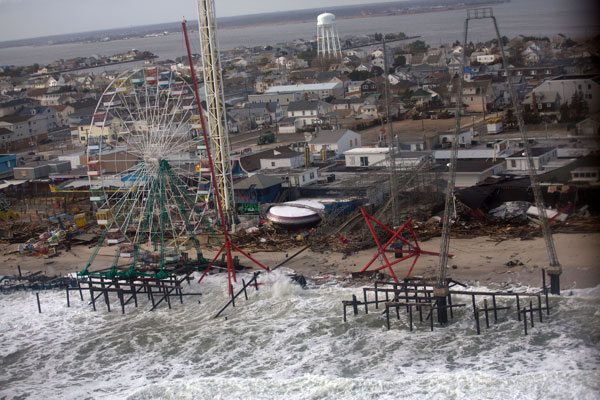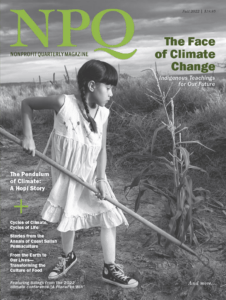
October 25, 2017; Next City
An effort to prepare for catastrophic flooding in the northeast US might provide some lessons to the nonprofit sector in how to approach collaboration.
Five years after Hurricane Sandy blasted into the shoreline of New Jersey, the city of Hoboken developed an exciting new idea on how to avert another such disaster. They applied for and got an award from the federal government for what’s being called “Resist, Delay, Store, Discharge.” Now, nearby Jersey City is launching a plan of its own. This $2 billion project would build a two-mile long seawall, do some landfill, and add new property close to the shoreline. The problem is that the flooding blocked by the seawall has a strong probability of heading toward Hoboken and could overwhelm the plan being developed there.
Sign up for our free newsletters
Subscribe to NPQ's newsletters to have our top stories delivered directly to your inbox.
By signing up, you agree to our privacy policy and terms of use, and to receive messages from NPQ and our partners.
A new report from the Regional Plan Association suggests that this kind of uncoordinated local planning is very common and unlikely to have any real success. “Coastal Adaptation: A Framework for Governance and Funding to Address Climate Change” outlines several key recommendations to avert disasters like storms on the scale of Hurricane Sandy and the consequences of the expected rise of coastal seawater as global warming melts the Arctic shelf. Key recommendations include:
- Produce and update a regional coastal adaptation plan that aligns policies across New York, New Jersey, and Connecticut.
- Develop and manage science-informed standards that would guide adaptation projects and development in the region.
- Coordinate and encourage collaborative adaptation projects across municipalities in all three states.
- Evaluate and award funding from new adaptation trust funds aligning with the standards that are to be established.
The plan argues that “coastal flooding is a regional risk that is largely managed locally,” which leads to an uncoordinated approach with conflicting interests, approaches, and priorities. The recommended Regional Coastal Commission would be a collaboration among existing entities in each of the three regions that are addressing climate change adaptation in some way already across a variety of disciplines. This would include, but should not be beholden to, politicians, according to the report.
Apparently (and remarkably), although one of the basic tenets of environmentalism is that everything is connected to everything else, no body like the Regional Coastal Commission exists anywhere in the United States to address issues of rising coastal water, although a similar recommendation was made for a regional body in the San Francisco area. The goal of keeping politicians involved—but a little at arm’s length—is to ensure the program cannot be politicized or made subject to changes in local political leadership. Of course, leadership and championship must emerge from somewhere, and it is in such cases that the civil sector—that is, philanthropy and nonprofits—need to step forward.—Rob Meiksins













